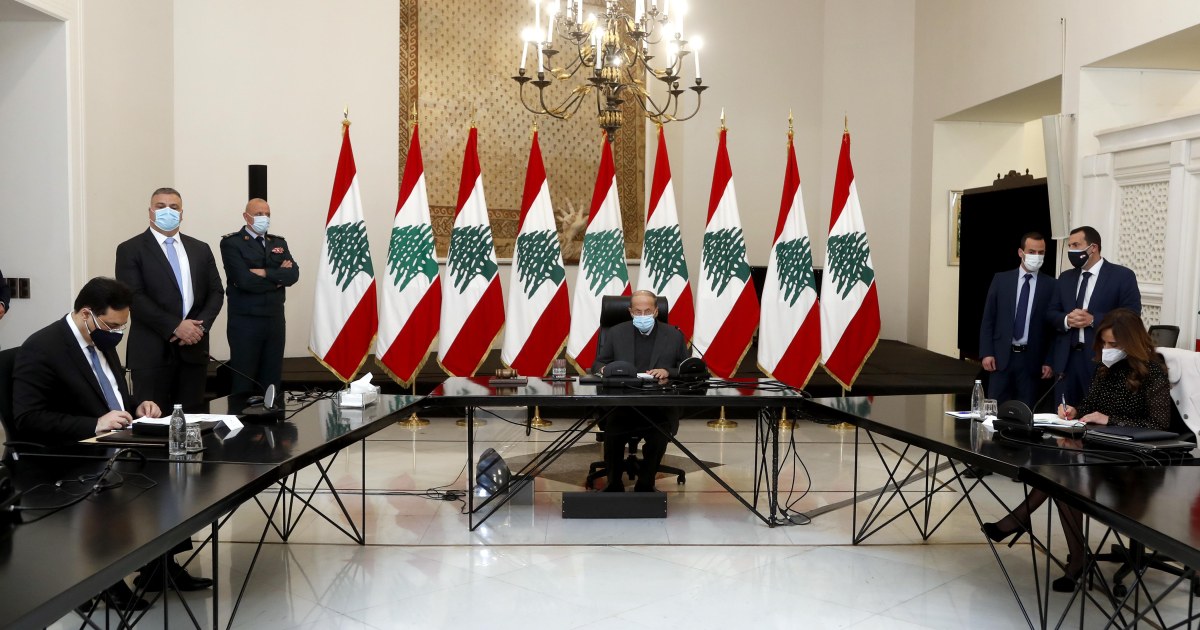Lebanese President Michel Aoun called on the security forces not to tolerate chaos after the recent protests over the deteriorating economic and living conditions, while the Lebanese Ministry of Energy announced a 35% increase in fuel prices in the country.
During a meeting of the Supreme Defense Council, today, Tuesday, Aoun said that the security authorities should not tolerate chaos in order to preserve general stability.
He added that the expression of opinion is safe for all, but it should not turn into chaos and riots.
In addition to President Michel Aoun, the meeting was attended by the caretaker Prime Minister Hassan Diab, a number of ministers and leaders of the security and judicial services.
The Lebanese president had called for this meeting to discuss the repercussions of the economic crisis on the security situation following the sporadic protest movements that took place in several Lebanese regions.
Protesters had closed major roads in Beirut, Tripoli and Sidon during the past few days to denounce the deteriorating living conditions as a result of the collapse of the value of the national currency, the scarcity of fuel, and the lack of basic materials from the markets.
During the recent protests, the demonstrators expressed their discontent with the long hours of power outage, sometimes exceeding 21 hours a day, in addition to the rationing imposed by the owners of neighborhood generators;
Due to the lack of fuel, which also led to the disruption of work in some hospitals on Monday, and the work of the General Security headquarters in Beirut was suspended, according to local media.
In the midst of a severe political crisis manifested by the delay in forming a new government, multifaceted crises are exacerbated in Lebanon with the high rate of unemployment and inflation, the absence of a large number of medicines, and the high prices of mostly imported foodstuffs;
This has accelerated the spread of poverty on a large scale, with half of the population now living below the poverty line, according to the United Nations.
Increase in fuel prices
Meanwhile, the Lebanese Ministry of Energy announced a 35% increase in fuel prices in the country, as the price of a can of gasoline became 62,000 Lebanese pounds.
This step comes in implementation of the caretaker government's decision to import fuels at an exchange rate for the dollar equivalent to more than twice its official price, in order to face the fuel shortage crisis.
The Syndicate of Fuel Distributors announced that the ships loaded with fuel had begun unloading their cargoes, and that distribution would start at gas stations today.
The crisis had reflected on all productive sectors and power plants.
In the developments of the crisis in Lebanon, Lebanese banks closed their doors today, in response to the Association of Banks’ call for a strike against the backdrop of dozens of young men storming the headquarters of the Lebanese Swiss Bank in Beirut, to demand funds for a charitable association.
The spokesman for the "Benin" Association, Muhammad Beydoun, had said that the young men stormed the bank and forced its management to transfer funds outside Lebanon to provide treatment for a number of patients, adding that their move came as a result of the banks stopping transferring depositors' money.
On the other hand, the management of the Lebanese Swiss Bank said that the association's accounts had been closed in compliance with the decision of the Special Investigation Commission at the Central Bank of Lebanon.

